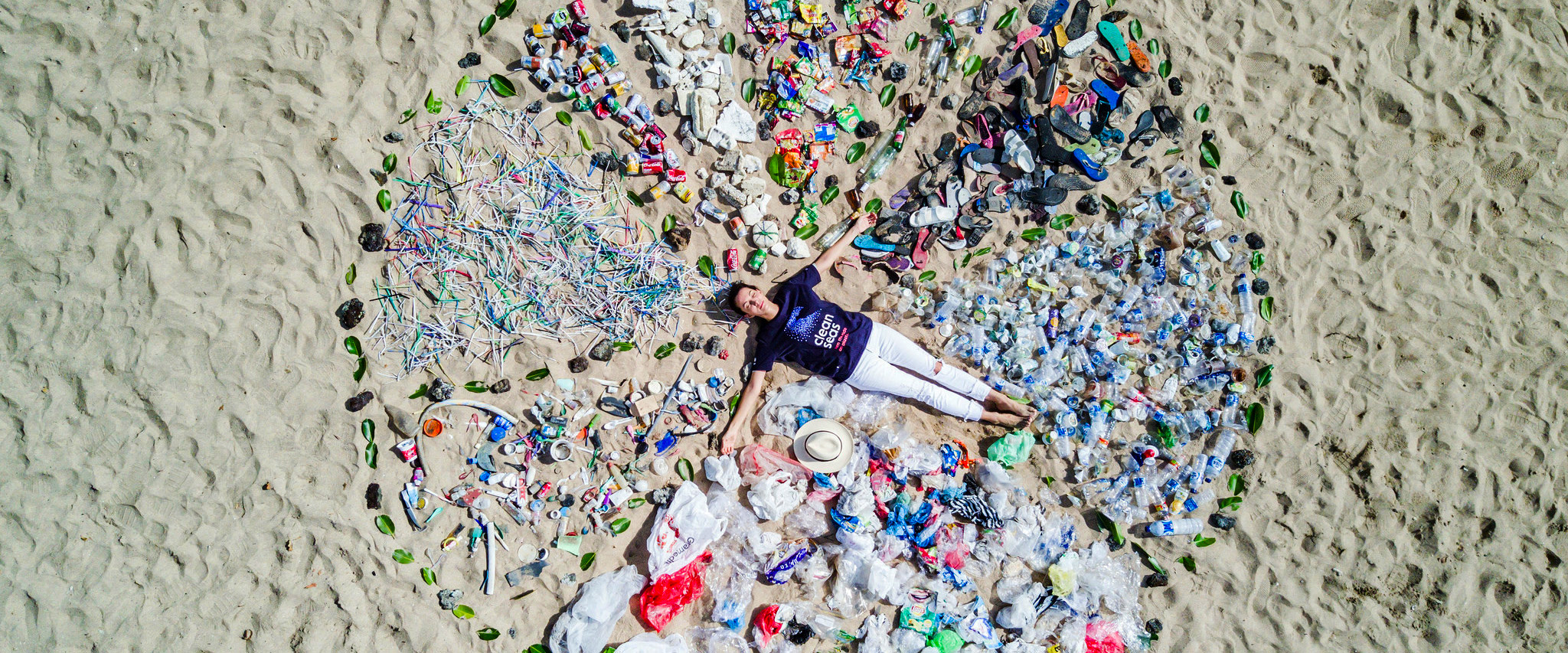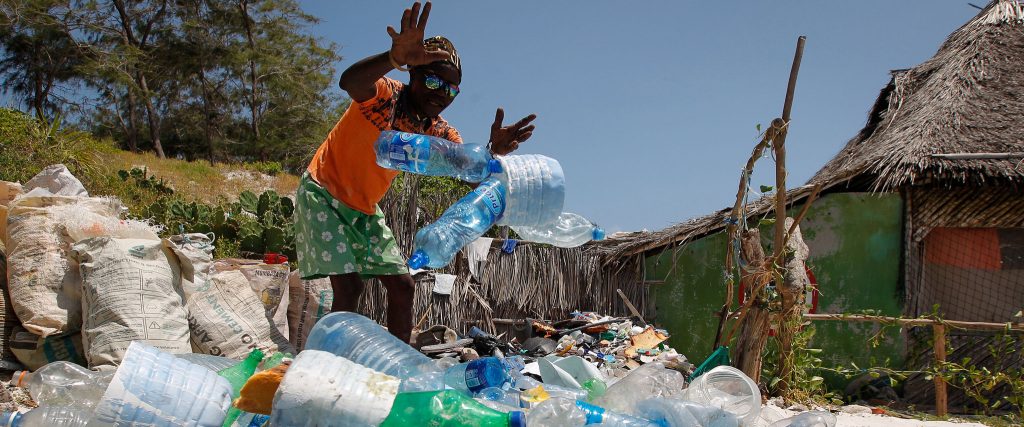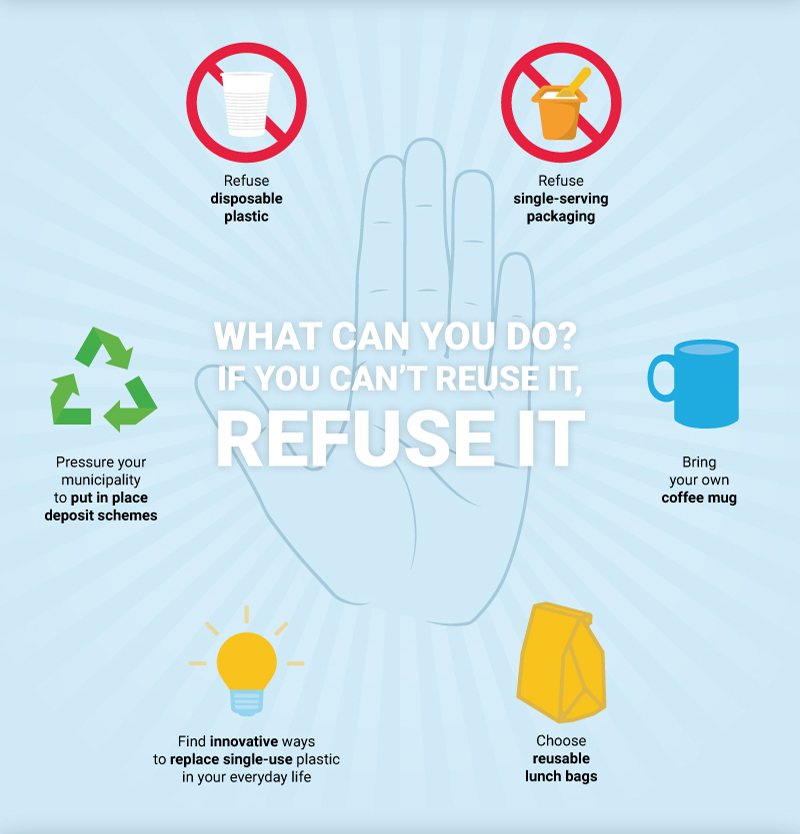
“On World Environment Day, the message is simple: reject single-use plastic. Refuse what you can’t re-use. Together, we can chart a path to a cleaner, greener world.” — Secretary-General, António Guterres
Humans are both creatures and moulders of their environment, which gives them physical sustenance and affords them the opportunity for intellectual, moral, social and spiritual growth. In the long and tortuous evolution of the human race on this planet a stage has been reached when, through the rapid acceleration of science and technology, humans have acquired the power to transform their environment in countless ways and on an unprecedented scale.
The United Nations, aware that the protection and improvement of the human environment is a major issue, which affects the well-being of peoples and economic development throughout the world, designated 5 June as World Environment Day. The celebration of this day provides us with an opportunity to broaden the basis for an enlightened opinion and responsible conduct by individuals, enterprises and communities in preserving and enhancing the environment. Since it began in 1974, it has grown to become a global platform for public outreach that is widely celebrated in more than 100 countries.
“Beat Plastic Pollution”
Each World Environment Day is organized around a theme that focuses attention on a particularly pressing environmental concern. The theme for 2018, “Beat Plastic Pollution,” is a call to action for all of us to come together to combat one of the great environmental challenges of our time. The theme invites us all to consider how we can make changes in our everyday lives to reduce the heavy burden of plastic pollution on our natural places, our wildlife – and our own health. While plastic has many valuable uses, we have become over-reliant on single-use or disposable plastic – with severe environmental consequences.
Learn more about this year’s theme.
This World Environment Day UN Environment is asking you, companies and civil society groups, to take a concrete action to Beat Plastic Pollution. Let’s all help to clean up our environment. You can register your #BeatPlasticPollution activity.
India, the host country
Every World Environment Day has a different global host country, where the official celebrations take place. This year it is India. Read more about the host country.
The environment and the Sustainable Development Goals
The 2030 Agenda for Sustainable Development states our resolve “to ensure the lasting protection of the planet and its natural resources”. In particular, Goals 14 and 15 focus on protecting under water and on land ecosystems, as well as on sustainably using marine and terrestrial resources.
Background
History of the plastic shopping bag
A rare novelty in the 1970s, plastic shopping bags are now an omnipresent global product, produced at a rate of one trillion a year. They are showing up in the darkest depths of the oceans to the summit of Mount Everest to the polar ice caps – and creating some major environmental challenges.
How did this happen?
- 1933 Polyethylene, the most commonly used plastic, is created by accident at a chemical plant in Northwich, England. While polyethylene had been created in small batches before, this was the first synthesis of the material that was industrially practical, and it was initially used in secret by the British military during World War II.
- 1965 The one-piece polyethylene shopping bag is patented by the Swedish company Celloplast. Designed by engineer Sten Gustaf Thulin, the plastic bag quickly begins to replace cloth and plastic in Europe.
- 1979 Already controlling 80% of the bag market in Europe, plastic bags go abroad and are widely introduced to the United States. Plastic companies begin to aggressively market their product as superior to paper and reusable bags.
- 1982 Safeway and Kroger, two of the biggest supermarket chains in the United States, switch to plastic bags. More stores follow suit and by the end of the decade plastic bags will have almost replaced paper around the world.
- 1997 Sailor and researcher Charles Moore discovers the Great Pacific Garbage Patch, the largest of several gyres in the world’s oceans where immense amounts of plastic waste have accumulated, threatening marine life. Plastic bags are notorious for killing sea turtles, which mistakenly think they are jellyfish and eat them.
- 2002 Bangladesh is the first country in the world to implement a ban on thin plastic bags, after it was found they played a key role in clogging drainage systems during disastrous flooding. Other countries begin to follow suit.
- 2011 Worldwide one million plastic bags are consumed every minute.
- 2017 Kenya bans plastic bags, making it one the most recent of the more than two dozen countries that have sought to reduce plastic bag use through fees or bans.
- 2018 #BeatPlasticPollution is chosen as the theme of World Environment Day, hosted this year by India. Companies and governments around the world continue to announce new pledges to tackle plastic waste.
History of World Environment Day
The year 1972 marked a turning point in the development of international environmental politics: the first major conference on environmental issues, convened under the auspices of the United Nations, was held from June 5-16 in Stockholm (Sweden). Known as the Conference on the Human Environment, or the Stockholm Conference, its goal was to forge a basic common outlook on how to address the challenge of preserving and enhancing the human environment.
Later that year, on 15 December, the General Assembly adopted a resolution (A/RES/2994 (XXVII)) designating June 5 as World Environment Day and urging “Governments and the organizations in the United Nations system to undertake on that day every year world-wide activities reaffirming their concern for the preservation and enhancement of the environment, with a view to deepening environmental awareness and to pursuing the determination expressed at the Conference.” The date coincides with the first day of the landmark Conference.
Also on 15 December, the General Assembly adopted another resolution (A/RES/3000 (XXVII)) that led to the creation of the United Nations Environment Programme (UNEP), the specialized agency on environmental issues.
Since the first celebration in 1974, the World Environment Day has helped UNEP to raise awareness and generate political momentum around growing concerns such as the depletion of the ozone layer, toxic chemicals, desertification and global warming. The Day has developed into a global platform for taking action on urgent environmental issues. Millions of people have taken part over the years, helping drive change in our consumption habits, as well as in national and international environmental policy.
This is the history of World Environment Day.

Take Action
Take part in the global movement to #BeatPlasticPollution
All over the world, UN Enviroment is inviting everybody, from individuals to goverments, small or big communities, schools, nonprofits, or businesses to plan events, to convert these events in a global movement, to take action and to share how you are participating to Beat Plastic Pollution. There are several ways governments, private sector and citizens can help to combat plastic pollution:
- Make a plan to beat the plastic pollution.
- Organize an event in your community and register your event.
- Make your event fun, inspiring and interesting.
- Take Action. Reduce, reuse and recycle.
- Share! Get your friends, family, neighbors, colleagues involved. Bring together an inspiring change.
Be a part of a global movement to break up with plastic. Remember, if you can’t use it, refuse it!
Sports are beating plastic pollution
From divers collecting waste from the seabed to joggers picking up rubbish as they run, athletes, sports enthusiasts and clubs are joining forces to tackle the tidal wave of plastic pollution that is poisoning the world’s oceans.
Major sporting events can generate up to 750,000 plastic bottles apiece, so the pressure is on to clean up the industry and use sport’s global reach to raise awareness among fans.
Here are some examples of sports and athletes that have risen to the challenge.
Football: Spurring others to act
Tottenham Hotspur may not win the Premier League this year, but the English club is top of the table in tackling plastic waste. In April it said it would phase out single-use plastics in its new stadium, due to open next season. The aim is to eliminate plastic straws, stirrers, cutlery and all plastic disposable packaging for these items.
In the United States, Adidas and Major League Soccer released special kits, made out of Parley Ocean Plastic, for matches played during the weekend of Earth Day. All 23 clubs wore the Adidas Parley 2018 MLS shirts, which are made from technical yarns created from plastic waste found on beaches and in coastal communities.
Sailing: Turning the tide on plastic
It’s the race of a lifetime and the cause of a generation. The Volvo Ocean Race sees seven teams race 45,000 nautical miles around the world over eight months in a gruelling competition that aims to raise awareness of sustainability issues, including the threat posed by marine plastic pollution. This year, the Turn the Tide on Plastic yacht is competing to highlight UN Environment’s Clean Seas campaign.
Cricket: Going green in India and striking out straws in the UK
In Bengaluru and Indore cities in India, a new “green protocol” is being put into play. In Bengaluru, Chinnaswamy stadium has adopted a zero-waste policy, using an army of green-clad volunteers to sort waste and educate spectators during Indian Premier League matches. Around 40,000 fans attend each match in the stadium, generating 3-4 tonnes of mixed waste each time. Because the waste is not separated, it has to be sent to the landfill.
In the UK last year, London’s Kia Oval cricket grounds said it aimed to become completely plastic-free by 2020. The venue has banned the use of plastic straws this season, introduced compostable coffee cups, and is phasing out the use of plastic bags in the club shop. Last year, Kia Oval introduced eco-friendly cups to replace its plastic pint glasses. It also installed 20 free water fountains and taps and provided 20,000 limited edition refillable bottles.
Rugby: Twickenham converts disposable cups to souvenirs
Twickenham, the home of the English rugby team, has introduced a reusable Fan Cup to replace the flimsy, disposable cups that were previously used during games.
When customers buy their first drink, they are charged an additional £1 refundable deposit. When they return to the bar with the cup, the price reverts to the advertised cost. At the end of the day, fans can keep the cup as a souvenir or return it and get their deposit back.
Previously, around 140,000 pints of beer could be served during an international match meaning 140,000 cups were likely to be thrown away.
Athletics: London seeks answers to marathon plastic bottle conundrum
This year’s London marathon was the hottest on record but it was also unique because organizers trialled the use of compostable cups to reduce the number of plastic bottles that typically litter the streets after the event. Around 90,000 cups were placed at three drink stations along the route, as well as 760,000 plastic bottles for runners. The bottles were all to be recycled after the race, and the use of the cups will be reviewed.
Commonwealth Games 2018: Australia’s Gold Coast bursts plastic balloon
The Commonwealth Games were held on Australia’s Gold Coast in April and organizers were determined to do everything they could to protect this beautiful region and the surrounding waterways and oceans. Helium balloons were banned from the event and spectators were encouraged to bring their own transparent bottle to refill at water points around the grounds.
Baseball: White Sox step up to the plate to ban straws
In April, Chicago’s White Sox became the first Major League Baseball team to serve drinks without single-use plastic straws as part of Shedd Aquarium’s “Shedd the Straw” initiative.
The team said the move would take more than 215,000 straws out of play over the season.
Swimming: Taking on the Pacific in the name of science
At 8,900 km, it’s no wonder it’s being called the Longest Swim. Adventurer and activist Ben Lecomte will set off in late May to swim from Tokyo to San Francisco and all in the name of science and sustainability. Lecomte’s odyssey will take him through the Great Pacific Garbage Patch, a raft-like mass of waste three times the size of France.
Lecomte and his support crew will contribute to eight research programmes during the swim, covering everything from plastic pollution to currents and radiation. Using a neuston net and water samples, the crew will make daily collections of marine microplastics to help researchers learn more about these tiny pollutants that are finding their way into our food chain.
Diving: UAE diving enthusiasts go deep to clean sea bed
In the United Arab Emirates, a group of deep-sea divers has been collecting tonnes of rubbish from the floor of the Arabian Sea to raise awareness of the damage caused by plastic waste while also documenting marine life in the area. Mohammad Falasi, a marine biologist, set up the team after he found the sea floor was covered with trash. Now he and his friends conduct clean-ups at the weekend, collecting plastic, metal, glass, ceramics, rubber, wood and charcoal.
Plogging: The new plastic-battling fitness craze
You don’t have to be an elite athlete to join the battle against plastics. You could try “plogging”. The Swedish trend, which involves picking up litter while you jog, is catching on and there will be plogging events across the globe on World Environment Day on June 5. The name comes from combining the Swedish word “plocka”, to pick with “jogga”, to jog.



